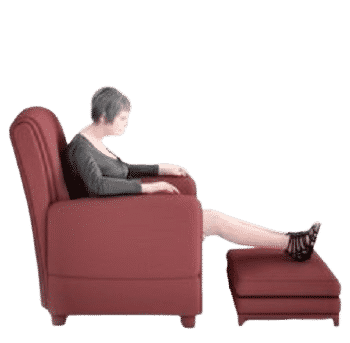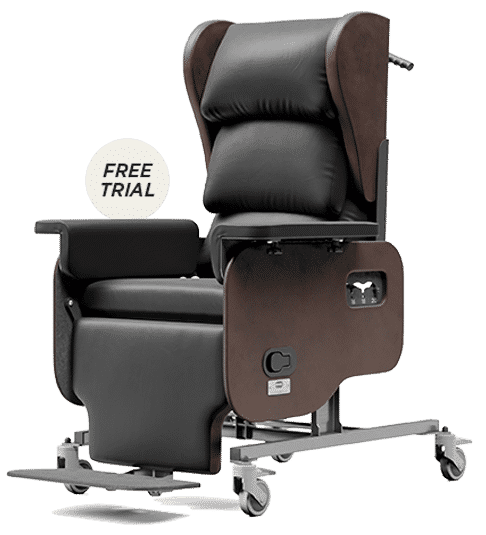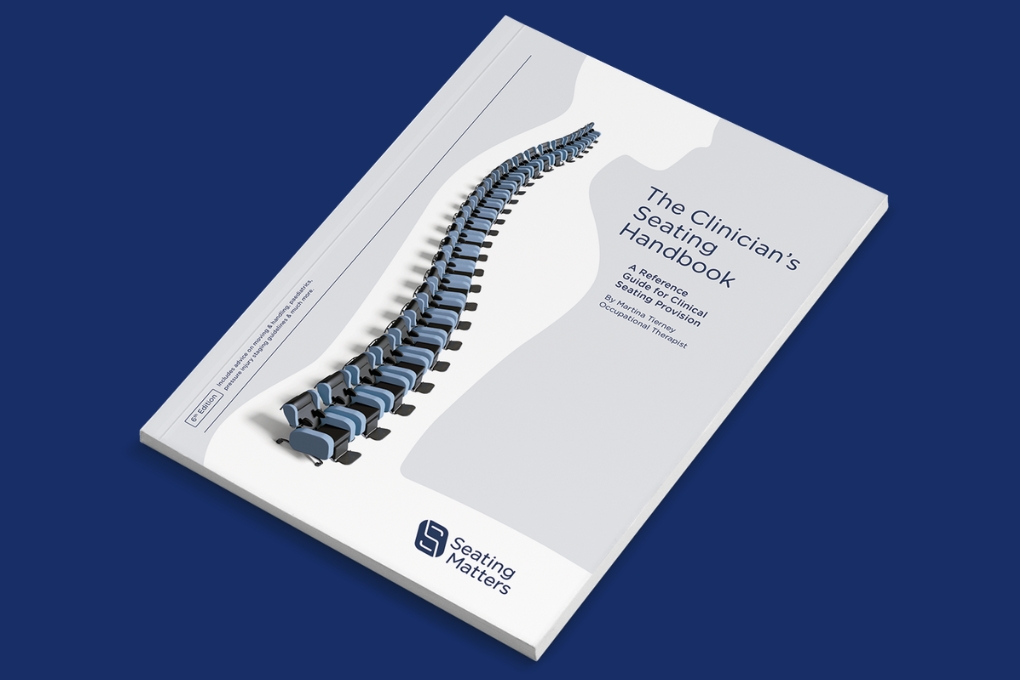Multiple Sclerosis and seating patients with complex needs
In a daily case load, each patient we encounter is different. They have individual needs which change and evolve throughout the duration of their medical condition. When seating patients with complex conditions such as Huntington’s Disease, Motor Neuron/ALS or Parkinson’s Disease, these needs can often be more challenging and severe.
Patients with complex conditions suffer from various uncontrollable symptoms meaning they can be more challenging to seat; these symptoms can include but are not limited to:
- Low mobility.
- Postural instability.
- Involuntary movements.
- Loss of voluntary movement.
- Low/high muscle tone.
- Rigidity.
- Muscle degeneration.
- Weakness.
- Fatigue.
- Confusion / altered mental state.
- Agitation.

Conditions That Can Prove Challenging to Seat
Parkinsons Disease – Those suffering from Parkinsons disease can suffer from arm and leg tremors, rigidity of the muscles, as well as pain in the back, neck shoulders and chest, which need to be considered in seating and selecting the correct chair.
Multiple Sclerosis / MS – Patients suffering from MS endure extreme fatigue, loss of muscular strength, pain, as well as spasticity of the muscles which can lead to uncontrolled movements. These need to be factored into selection of the right seating solution.
ALS/Motor Neuron Disease – Patients with ALS/Motor Neuron Disease often present spasticity of the muscles which can lead to uncontrolled muscle movements, muscle degeneration and weakness which can eventually lead to paralysis of the limbs. Their rapidly changing needs need to be accommodated in one solution and can be catered for in a multi adjustable chair.
Huntington’s Disease – It has been said that having Huntington’s Disease Feels Like having ALS, Parkinson’s and Alzheimer’s Disease, all at the same time. One of the most significant side effects of Huntington’s Disease is involuntary movements of the trunk, arms and feet which can result in falls and in the patient coming to extra harm. Comfort and safety are key considerations in selecting an appropriate chair for Huntington’s Disease patients.
Dementia / Alzheimher’s Disease – Patients with Dementia and Alzheimer’s can be one of the most difficult patient groups to seat. This client group present a number of complex needs including agitation in the chair, constant moving in the chair which might leave them at risk of falls and sliding from the chair causing injury.
In our experience, these conditions are some of the most challenging patient conditions to seat as they have a variety of symptoms from their neurological condition which need to be accommodated in one seating solution. Quite often these patients are cared for at home by family members or full-time carers, so it’s important that their seating solution is affordable, reliable, functional, easily adjustable and adaptable to their needs as their condition changes.
Tips for Families and Caregivers
- Get a proper seating assessment – we can help. We have Seating Specialists in your area who can support in a free of charge, no obligation seating assessment, at a time and place to suit you.
- Make sure the patient is comfortable. This goes without saying, if the patient is not comfortable in the chair, the other functions are rendered virtually worthless.
- Know your requirements. Opt for multi – adjustable seating. Know which features are required to accommodate the needs of the patient, and ensure they come as standard on your chair. All of our chairs as standard have back angle recline and a footplate. Do they need postural support? Accessories such as lateral supports can aid postural deformities and can be added at a later date. You can check out our range of chairs here which are multi adjustable to suit changing needs.
- Consider the level of pressure care. Ensure that the chair provides adequate pressure management properties. These patients are sitting for long periods throughout the day and can be subject to risk of pressure ulcers which can be debilitating. Our chairs are made with memory foam in the back, seat and calf pad as standard. Tilt in space and back angle recline can also aid in pressure management and loading the body.
- Consider Chair Materials and Fabrics. As a lot of these patient groups are at risk of involuntary movements or altered mental states, they can also move a lot in their chair/be at risk of sliding and falling, and therefore be exposed to further risk from shear and friction which can ultimately lead to pressure ulcers. All the weight bearing areas on our chairs are covered with Dartex material which is multi stretch, breathable and durable to reduce moisture, increase circulation and reduce the effects of friction and shear.
- Patient dignity. Can the person sit at the table to dine or join others in the family room? To encourage dignity and independence of patients these are very important factors to consider when choosing your seating. Seating Matters chairs are very mobile throughout a home or care facility, and can have powered adjustments for tilt in space and repositioning, allowing users to be more independent.
As used by








Multiple Sclerosis Chairs
Living with Multiple Sclerosis makes daily life an uphill battle. With great care, things can improve, but without the right support structures to complement that care, the ability of caregivers to deliver to the best of their abilities and for patients to feel the comfort that they long for is hampered.
An autoimmune disease of this nature poses many complications that must be managed effectively to prevent secondary issues making matters worse. The presence of a multiple sclerosis chair that was designed to counteract the negative aspects of this condition is the solution that all patients and caregivers benefit from.
Here at Seating Matters, our mission is to create the very best chairs for those that have special needs. Our background in Occupational Therapy affords us 30 years of knowledge, practice and intensive research, all of which is filtered into the incredible chairs that we produce.
A Specialised Support Chair is Essential for MS Patients
The inability to control muscle stiffening and spasming unpredictably creates issues for patients suffering from Multiple Sclerosis, even when they are in a seated position. It is much more likely that they will shift in position, slide or even fall from their chair when improperly supported. Thus, they must have an MS chair that can be adjusted easily to provide them with the safety, security and comfort that they require.
For any care facility or hospital, the wellbeing of the patients must be never in doubt. Naturally, caregivers have many duties to carry out throughout the day, which means that their attention must often stay focused on completing specific tasks for the patient. In the absence of appropriate seating, a sudden spasm could lead to an injury or a fall.
The Multiple Sclerosis Chair That’s Built With the Patient in Mind
At Seating Matters, our chairs are designed to be as easy to use as possible. No tools are required to make an adjustment to the chair and any change can be made in less than a minute. We have designed our chairs to promote good posture, deliver effective pressure management, make mobility and transfers simple for all parties concerned and you can trust that our chairs are appropriate and can be adjusted to the dimensions of the majority of individuals and their needs.
Health and hygiene are a key part of effective care. As such, we have taken measures to prevent the spread of infection. Our chairs are upholstered in a hard-wearing, enduring contract vinyl that is proven to counteract MRSA, C.Difficile and E.Coli, as well as the vast majority of bacteria. All electric components are sealed, all parts can be dismantled and hospital-grade cleaning agents are safe to use without causing damage to the fabric.
MS Chair Stringent Testing Backed by a 7-Year Warranty
We guarantee high-quality manufacturing standards and that stringent testing has been carried out before any chair leaves our facility. This affords you absolute confidence that your care chair is built for the purpose you bought it for.
We even back it with an unparalleled 7-year frame warranty. Our dedication to continuing to be the benchmark for all other care chairs is backed by clinical evidence that our chairs can help to prevent pressure injuries and sores.
At Seating Matters, we encourage those that are searching for an effective Multiple Sclerosis chair to contact us today and enquire about booking a free chair trial. We also provide free seating assessments to determine the best chair for the patient that you are caring for. Rest assured, once seated in our chairs, your patient will experience the comfort they need and find the dignity that they deserve.
Seating Matters provides clinical healthcare seating chairs for Disabled & Elderly people in Australia. We sell kyphosis chairs, orthopedic chairs, cerebral palsy chairs, occupational therapy chairs, parkinsons disease chairs, huntington’s disease chairs, tilt space chairs, fall prevention chairs, motor neuron chairs, brain injury chairs, Paediatric chairs & other seating range in Australia. Browse our website for more information or contact us for more details.
Read Less




